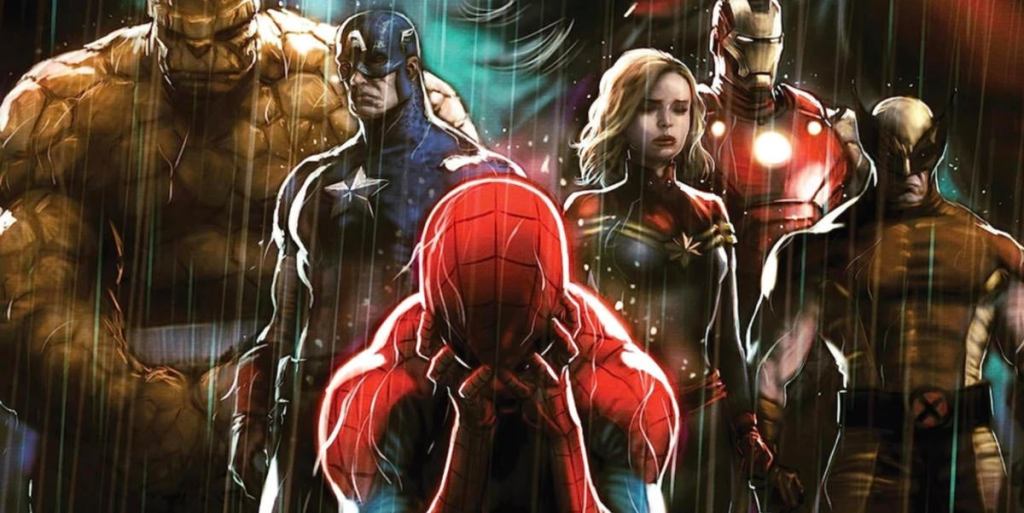Death in superhero comics—specifically the never-ending, decades-long sagas published by both Marvel and DC—can quickly turn long-time readers cynical because it never lasts. As soon as news of Kamala Khan’s death in The Amazing Spider-Man #26 was leaked, readers understood that Ms. Marvel would return in her own series before November when the character made her big screen debut in The Marvels (most likely as a mutant, in order to match the MCU’s lore). That’s the nature of the business and it’s not changing.
Videos by ComicBook.com
However, the unending cycle of life and death in superhero comics doesn’t require cynicism from readers. The superhero genre, at its best, provides colorful, sweeping drama distilling the constant challenges of everyday life into epic struggles that make mundane conflicts and tragedies easier to comprehend. It’s not a question of whether a character’s death matters, but how it is made to matter when it occurs. In this regard, Fallen Friend: The Death of Ms. Marvel succeeds in fitting fashion as it assembles a roster of Ms. Marvel’s most significant storytellers to address the “life” of this inspirational, young hero.

The issue divides a single event—a khatm, the traditional Muslim reading of the Qu’ran to honor the dead, at Kamala’s mosque—into three parts, each focusing on a different aspect of her publishing history depicted by creators who influenced it. This structural choice proves to be wise as it develops a consistent tone and overarching thread that makes the issue read as a satisfying whole, even if each element merits its own consideration.
The first portion, “Kamala,” is written by Ms. Marvel co-creator G. Willow Wilson who is accompanied by her debut series’ artist Takeshi Miyazawa and it stands out as the most powerful portion of the issue. Emphasis is placed on the outstanding supporting cast of characters developed in the early volumes of Ms. Marvel as Kamala’s friends and family arrive at the mosque and speak amongst themselves. Wilson possesses a knack for portraying mundane humans within the confines of Marvel Comics; her characters possess personality and perspective as soon as they appear and it prevents them from being overshadowed by the likes of Wolverine or Captain Marvel when they appear later.
Instead, Wilson emphasizes the human figures in her cast to effectively portray the process of grieving and speak directly to why so many readers responded to Ms. Marvel when she appeared in comics. The relatability of this section is significantly enhanced by Miyazawa’s expressions and silhouettes, capably capturing each individual in unmistakable fashion and keeping them emotionally engaged, regardless of what dialogue is present. Rather than building upon nostalgia, Wilson and Miyazawa remind readers why their past work is still so impactful.
The second portion is labeled “Champions” and emphasizes the teen-team Kamala led, written by Mark Waid and drawn by Humberto Ramos and Victor Olazaba. It will likely play best for fans of their Champions series as it spends much of its space addressing lingering plot threads leftover from it. Memories of their adventures are presented in flashback panels distinguished by Edgar Delgado’s colors, and these quick beats serve to reminisce about Ms. Marvel’s distinctive position within Marvel Comics’ pantheon. Drama between Amadeus Cho and Viv Vision distracts from the proceedings and feels out of place given its grounding in a largely-unrelated series canceled years ago, though.
The final section, “Avenger,” is written by Saladin Ahmed and drawn by Andrea Di Vito, the former of whom wrote Ms. Marvel’s last solo series. It considers the responses of multiple Marvel Comics icons, including Iron Man, Captain America, and Spider-Man, as they reflect on the tragic loss of their young peer. The perspective is altered by the nature of these characters as Cap speaks in speeches and Doctor Strange questions the nature of sacrifice; they aren’t as obviously human as the figures who appear in “Kamala.” But they also deliver the sort of grand speeches and sharp dialogue that often make superhero comics sing and it’s apparent that Ahmed has considered the subject matter well. For all of the comfort these heroes seek to provide, they stop short of speaking in bromides and acknowledge the unjustifiable tragedy found in losing someone so young.
The struggle to make sense of something so senseless is filtered through the perspectives of idealistic patriots and super scientists, but the core of the feeling is ultimately human. My experience teaching high school has made encountering events similar to this one inevitable and I could sense many of my own responses reflected in Ahmed’s writing here. The issue’s final moment is especially well chosen as Spider-Man swings in only to realize that there are no words before finding a few that will suffice.
Although Fallen Friend: The Death of Ms. Marvel is heavy, it balances that weight with positive emotions as highlighted in the best part of “Champion.” Di Vito contributes a humorous action beat near the end, providing readers a much-needed laugh without undermining the issue’s sense of gravitas. None of the three segments wallow in the misery of death; they opt instead to focus on the living and how we respond to death. This perspective is what allows Fallen Friend to succeed.
However readers may feel about the events of The Amazing Spider-Man #26, there’s no denying that Fallen Friend: The Death of Ms. Marvel delivers a stirring tribute to Kamala Khan and a poignant reflection on the loss of a human being so young. Each of the assembled creative teams build upon their connections to the character and what she embodies in order to say something of value. On a topic for which there are often no words, they find words and images capable of saying something worthwhile. While Ms. Marvel will inevitably return, her temporary death creates an opportunity for this issue of Marvel Comics to remind us how superheroes may inspire us in life.
Published by Marvel Comics
On July 12, 2023
Written by G. Willow Wilson, Mark Waid, and Saladin Ahmed
Art by Takeshi Miyazawa, Humberto Ramos, Andrea Di Vito, and Victor Olazaba
Colors by Ian Herring and Edgar Delgado
Letters by Ariana Maher
Cover by Kaare Andrews









